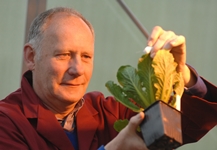Life Sciences News
See our Latest Journal Publications
Insecticide-based brassica seed treatment to help protect against Turnip yellows virus, estimated to save the industry £58M in 2015
 Research by Dr John Walsh from the School of Life Sciences, funded by the Horticultural Development Company, has provided the scientific evidence required to justify an Emergency Crop Protection Authorisation enabling the use of an insecticide-based seed treatment in the UK.
Research by Dr John Walsh from the School of Life Sciences, funded by the Horticultural Development Company, has provided the scientific evidence required to justify an Emergency Crop Protection Authorisation enabling the use of an insecticide-based seed treatment in the UK.
John’s research demonstrated the role played by peach-potato aphid in carrying Turnip yellows virus (TuYV), the most damaging of all viruses transmitted by aphids in brassica crops, which results in yield losses and tipburn after storage. The seed treatment technique protects plants from aphid attack for up to ten weeks after planting and effectively reduces and delays TuYV infections.
The Brassica Growers Association estimated that this has saved the industry around £58M in 2015 due to the reduced requirement for additional insecticide treatments, and prevention of yield and storage losses. Current research funded by BBSRC is based on developing an integrated strategy for control of TuYV in crops.
